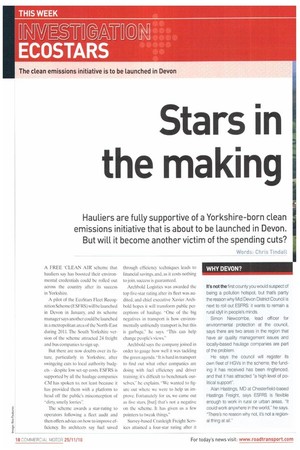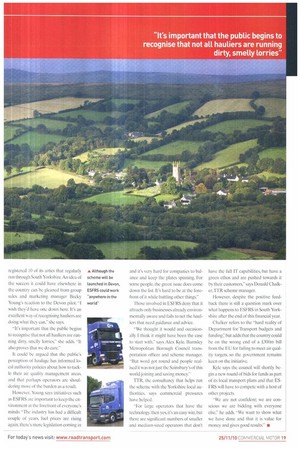Stars in the making
Page 18

Page 19

If you've noticed an error in this article please click here to report it so we can fix it.
Hauliers are fully supportive of a Yorkshire-born clean emissions initiative that is about to be launched in Devon. But will it become another victim of the spending cuts?
Words: Chris Tindall
A FREE 'CLEAN AIR' scheme that hauliers say has boosted their environmental credentials could be rolled out across the country after its success in Yorkshire.
A pilot of the EcoStars Fleet Recognition Scheme (ESFRS) will be launched in Devon in January, and its scheme manager says another could be launched in a metropolitan area of the North-East during 2011. The South Yorkshire version of the scheme attracted 24 freight and bus companies to sign up.
But there are now doubts over its future, particularly in Yorkshire. after swingeing cuts to local authority budgets — despite low set-up costs. ESFRS is supported by all the haulage companies CM has spoken to, not least because it has provided them with a platform to head off the public's misconception of "dirty, smelly lorries".
The scheme awards a star-rating to operators following a fleet audit and then offers advice on how to improve efficiency. Its architects say fuel saved through efficiency techniques leads to financial savings, and, as it costs nothing to join, success is guaranteed.
Archbold Logistics was awarded the top five-star rating after its fleet was audited, and chief executive Xavier Archbold hopes it will transform public perceptions of haulage. "One of the big negatives in transport is how environmentally unfriendly transport is, but this is garbage," he says. -This can help change people's views."
Archbold says the company joined in order to gauge how well it was tackling the green agenda. "It is hard in transport to find out what other companies are doing with fuel efficiency and driver training: it's difficult to benchmark ourselves," he explains. "We wanted to figure out where we were to help us improve. Fortunately for us, we came out as five stars, [but] that's not a negative on the scheme. It has given us a few pointers to tweak things."
Surrey-based Cranleigh Freight Services attained a four-star rating after it
registered 10 of its artics that regularly run through South Yorkshire. An idea of the success it could have elsewhere in the country can be gleaned from group sales and marketing manager Becky Young's reaction to the Devon pilot. -1 wish they'd have one down here. It's an excellent way of recognising hauliers are doing what they can," she says.
"It's important that the public begins to recognise that not all hauliers are running dirty, smelly lorries," she adds. "It also proves that we do care."
It could be argued that the public's perception of haulage has informed local authority policies about how to tackle their air quality management areas, and that perhaps operators are shouldering more of the burden as a result.
However, Young says initiatives such as ESFRS are important to keep the environment at the forefront of everyone's minds: "The industry has had a difficult couple of years, fuel prices are rising again, there's more legislation coming in
and it's very hard for companies to balance and keep the plates spinning. For some people, the green issue does come down the list, It's hard to be at the forefront of it while battling other things."
Those involved in ESFRS deny that it attracts only businesses already environmentally aware and fails to net the hauliers that need guidance and advice.
"We thought it would and occasionally I think it might have been the case to start with," says Alex Kyle. Barnsley Metropolitan Borough Council transportation officer and scheme manager. "But word got round and people realised it was not just the Sainsbury's of this world joining and saving money."
TTR, the consultancy that helps run the scheme with the Yorkshire local authorities, says commercial pressures have helped.
"For large operators that have the technology, then yes, it's an easy win, but there are significant numbers of smaller and medium-sized operators that don't
have the full IT capabilities, but have a green ethos and are pushed towards it by their customers," says Donald Chalker, TIR scheme manager.
However, despite the positive feedback there is still a question mark over what happens to ESFRS in South Yorkshire after the end of this financial year.
Chalker refers to the "hard reality of Department for Transport budgets and funding'," but adds that the country could he on the wrong end of a 1300m bill from the EU for failing to meet air quality targets, so the government remains keen on the initiative.
Kyle says the council will shortly begin a new round of bids for funds as part of its local transport plans and that ESFRS will have to compete with a host of other projects.
"We are not confident; we are conscious we are bidding with everyone else," he adds. "We want to show what we have done and that it is value for money and gives good results." is




































































































































